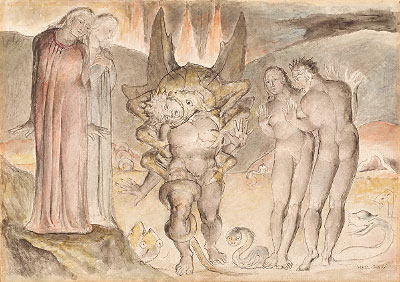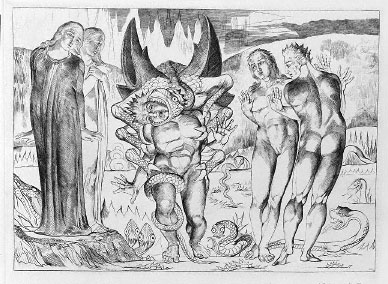 |
Illustrations to Dante's The Divine Comedy The Angel at the Gate of the City of Dis |
In
order to continue their journey through the underworld Virgil and Dante
needed assistance in transitioning from the Inferno to the Pergatorio.
First Lucia
carried the sleeping Dante up the steepest assent out of Hell. But they
arrived at a locked gate guarded by Dis (or Satan or Pluto.) Virgil
called for assistance and an Angel was sent to unlock the gate so that
they could enter the outer reaches of Purgatory and continue their
travels.
Blake
portrays Virgil and Dante outside the wall. They are both fearful:
Dante that they will never get out of hell, and Virgil that the help
that they needed would never arrive. Above the gate in the wall, the
Furies who determined the span of a human's life, threatened the
travelers. When the Angel arrived he carried a wand whose touch
effortlessly opened the gate.
This
passage in Dante would have been one of the more pleasing for Blake to
illustrate. Blake understood that Divine Intervention was required in
desperate situations. When blocked by closed pathways and unfounded
fears, the circumstances may necessitate help from the very force which
had initiated the journey. Dante and Virgil are pictured as small and
cowering in despair. The Angel is large and strong, fully capable of
accomplishing his assignment.
Matthew 17
[20]
If ye have faith as a grain of mustard seed, ye shall say unto this
mountain, Remove hence to yonder place; and it shall remove; and nothing
shall be impossible unto you.
Dante Alighieri
Canto IX
“O my lov’d guide! who more than seven times
Security hast render’d me, and drawn
From peril deep, whereto I stood expos’d,
Desert me not,” I cried, “in this extreme.
And if our onward going be denied,
Together trace we back our steps with speed.”
My liege, who thither had conducted me,
Replied: “Fear not: for of our passage none
Hath power to disappoint us, by such high
Authority permitted. But do thou
Expect me here; meanwhile thy wearied spirit
Comfort, and feed with kindly hope, assur’d
I will not leave thee in this lower world.”
...and even now
On this side of its entrance, down the steep,
Passing the circles, unescorted, comes
One whose strong might can open us this land.”
Jerusalem, Plate 62, (E 213)
"Jesus replied. I am the Resurrection & the Life.
I Die & pass the limits of possibility, as it appears
To individual perception. Luvah must be Created
And Vala; for I cannot leave them in the gnawing Grave.
But will prepare a way for my banished-ones to return
Come now with me into the villages. walk thro all the cities.
Tho thou art taken to prison & judgment, starved in the streets
I will command the cloud to give thee food & the hard rock
To flow with milk & wine, tho thou seest me not a season
Even a long season & a hard journey & a howling wilderness!
Tho Valas cloud hide thee & Luvahs fires follow thee!
Only believe & trust in me, Lo. I am always with thee!"
Marriage of Heaven and Hell, Plate 21, (E 43)
"Have now another plain fact: Any man of mechanical talents
may from the writings of Paracelsus or Jacob Behmen, produce ten
thousand volumes of equal value with Swedenborg's.
and from those of Dante or Shakespear, an infinite number.
But when he has done this, let him not say that he knows
better than his master, for he only holds a candle in sunshine."
Inscriptions, (E 690)
"It seems as if Dantes supreme Good was something Superior to
the Father or Jesus [as] <for> if he gives his rain to
the Evil & the Good & his Sun to the just & the Unjust He could
never have Builded Dantes Hell nor the Hell of the Bible neither
in the way our Parsons explain it It must have been originally
Formed by the Devil Himself & So I understand it to have been
Whatever Book is for Vengeance for Sin & whatever Book is
Against the Forgiveness of Sins is not of the Father but of Satan
the Accuser & Father of Hell"
Letters, (E 781)"Mr Linnell, Cirencester Place, Fitzroy Square
[February 1827]Dear Sir
I thank you for the Five Pounds recievd to Day am getting
better every Morning but slowly. as I am still feeble &
tottering. tho all the Symptoms of
my complaint seem almost gone as the fine weather is very
beneficial & comfortable to me I go on as I think improving my
Engravings of Dante more & more & shall soon get Proofs of these
Four which I have & beg the favor of you to send me the two
Plates of Dante which you have that I may finish them
sufficiently to make some Shew of Colour & Strength"
Notes from post by John Stamps
"A
pentecostal wind announces the arrival of a great spiritual power: “A
sound like the sound of a violent wind.” A great spiritual siege is
about to erupt against the malevolent forces of darkness.
... God sends us an anonymous angel.
...He holds a wand — a little tiny wand!
...All
the warnings by the demons and the Furies were one-hundred-and-ten
percent bluster and bluff. Virgil and Dante enter the iron walls of Dis
completely unopposed.
...We
see how the demons bluster, bluff, and threaten us. But we know their
only power is deceit and deception. If you buy the lies of the demons,
their power is terrifying."






